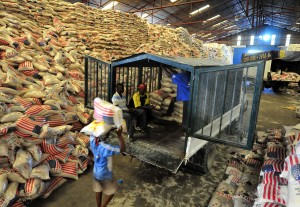
· Work in Haiti continues. Reports say that most people are having their basic needs—food and water—met. Temporary shelter is being distributed-but only around 70,000 or the 200,000 to 300,000 families displaced have received tents or tarps.
· More than 480,000 people have left Port-au-Prince for locations outside the city. More than 90 percent of these people have sought shelter with relatives or friends. These households—many already teetering on the edge of food insecurity—are at high risk in the coming days and weeks. The need to target these homes—as well as respond to the needs in Port-au-Prince and other quake affected areas—is significant.
· The plight of Haitian children continues to be a major media focus. UNICEF estimates there are 375 orphanages hosting 230,000 children in need of support. It continues to be important to note that because of extreme poverty many face in Haiti, orphanages often house children who have living parents. After the quake, the United States government is still requiring that all appropriate steps be taken to ensure children do not have living parents or close relatives in Haiti before adoption is considered. The Department of Homeland Security has said, at least until proper legal mechanisms are in place, only adoptions in process before the earthquake can continue. The long term goal is to strengthen and reunite families and enable them to care for their own children. Continue to pray for the safety and protection of children as well as the reunification of families who have been separated.
· On February 1, schools not affected by the earthquake reopened. Between 2,500 and 4,600 schools were not able to reopen. The international community is working quickly to provide school materials, shelter and other necessary goods to benefit more than 720,000 students as soon as possible.
· World Relief’s food distributions are shifting. The World Food Program is centralizing their distributions through 7 organizations each established to serve the 17 districts in the city. World Relief is working to ensure those churches and organizations we have been providing food for are transitioned into the new distribution system. This week, we will continue to provide food at King’s Hospital and a church in Mais Gate. World Relief plans to continue to participate in feeding centers and distributions as we move forward, but the method is likely to change as the situation on the grounds shifts into longer term recovery. Pray for continued cooperation of organizations on the ground.
· World Relief is distributing water as well as planning for long-term water sources in communities. World Relief’s team has delivered 20 truck loads of water, a total of 64,000 gallons, to displaced quake survivors. Our long-term plans include partnering with a local Christian organization to drill six boreholes—each around 100 feet deep—in targeted communities. These, costing about $7000 to drill, will be equipped with submersible pumps and provide a sustainable water supply in each community. To read more about churches and communities involved in water distribution, click here.
· World Relief secured the donation of 2,000 tarps—which will be distributed to vulnerable families this week. We will continue to access additional tarps in the coming weeks.
· In the United States, World Relief’s local offices are mobilizing to provide support for Haitians seeking Temporary Protective Status enabling them to work and travel in the United States. World Relief’s Stephan Bauman, Amy Tenney and Jenny Hwang will join other organizations tomorrow in a briefing on Capitol Hill.


